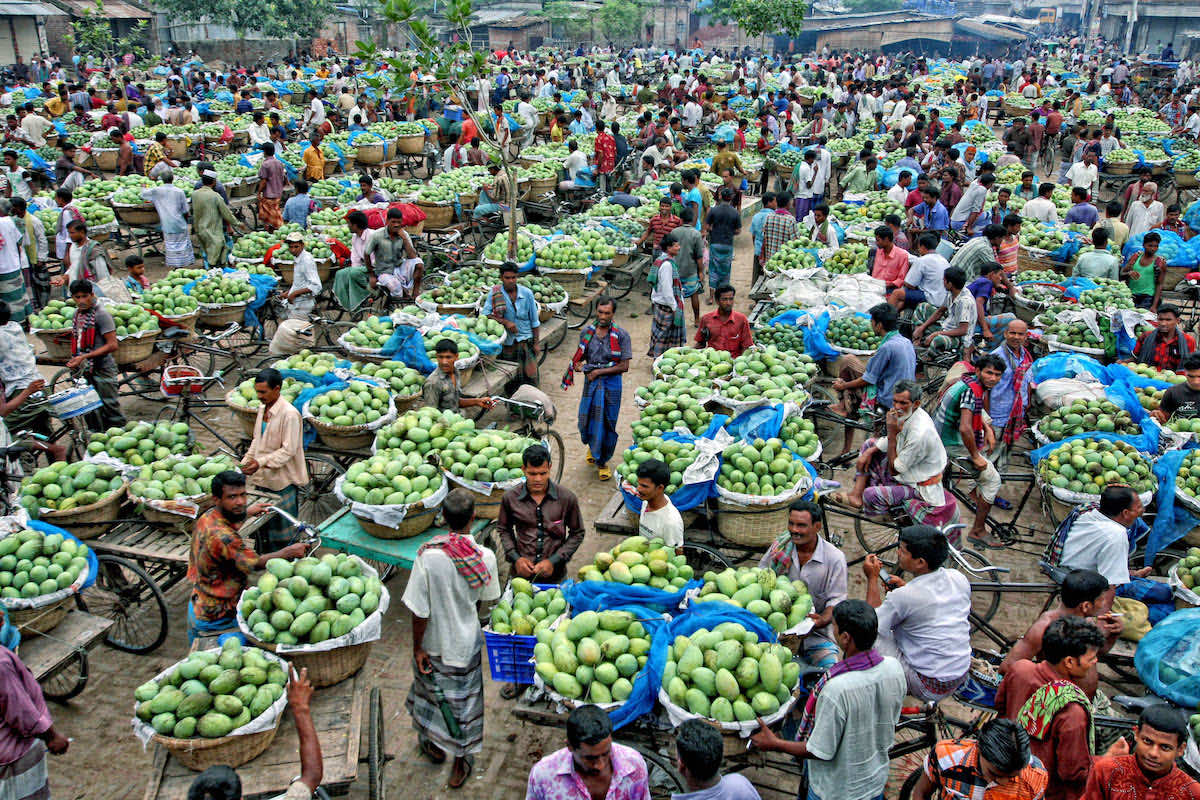Bangladesh has used a national icon to signal a fresh appetite
for improved ties with Pakistan – just as China looms.

Recently Bangladesh’s Prime Minister Sheikh Hasina sent a local variant of sweet mangoes known as Haribhanga to her counterparts in India and Pakistan. Why mangoes? The mango represents the epitome of Bangladeshi produce, like the French or Italians are proud of their wines, the Germans and the Japanese of their cars, or the Norwegians of their salmon and cloudberries. In recent years, the mango has become a key element of Bangladesh’s public diplomacy globally, a gesture of friendship and goodwill.
Sending mangoes to India was expected. Bangladesh wants to harness a close and warm relationship with its giant neighbour. But sending a bushel of the fruit to Pakistan was perhaps more of a surprise – doubly so when Pakistan sent mangoes in return, to both Bangladesh’s prime minister and president.
The reciprocal exchange of mangoes appears to be a sign that Bangladesh and Pakistan are considering a recalibration of their relationship, 50 years after the traumatic separation of what was then East and West Pakistan in 1971.
Both Bangladesh and Pakistan are among the top ten mango exporting countries. Pakistan prides itself on a different variety of mangoes, which make up a significant proportion of its exports with an estimated annual value of US$127 million. In Bangladesh the mango is a staple food and the country is obsessed with the fruit.

Considering the economic significance of mangoes to their respective local economies, both Bangladesh and Pakistan send mangoes to friendly countries as a diplomatic gesture to symbolise closer relations. As both countries compete in the mango market globally, the exchange of mangoes at high levels will inevitably be seen as a sign of improving ties.
The Bangladesh-Pakistan relationship is a thorny one, stretching back to the creation of Pakistan following the British withdrawal from the Indian subcontinent. Following the 1947 partition of British India, East Bengal (today’s Bangladesh) was under West Pakistan administration and known as East Pakistan, resulting in separate states for Muslims and secular India.
However, soon the Bengalis of East Pakistan realised that despite religious unity, there was a gulf of cultural and linguistic differences between the two parts of Pakistan, separated by 2000 kilometres of Indian territory. The myth of religious unity couldn’t hold Pakistan together as Bengali nationalism emerged to counter the political dominance of West Pakistan throughout the 1950s and 1960s.
The gesture of sending mangoes to Pakistan is a significant one. It indicates that despite differences, Bangladesh is willing to steer the relationship towards a friendlier path.
A sense of economic deprivation and political exploitation by West Pakistan was strong among Bengalis and reached a tipping point when in 1970 the Awami League was denied the chance to form government despite winning most seats in the national election. An indiscriminate attack by Pakistani soldiers against civilians on 25 March 1971 triggered armed resistance.
With India’s active diplomatic, political and military backing, Pakistan lost the fighting to Bengali Muktijoddhas, or freedom fighters. Known as the 1971 India-Pakistan War in Pakistan, in Bangladesh the conflict is called the War of Independence. But the lingering dispute is far more than nomenclature. Pakistan has never apologised for mass atrocities against Bengalis and this history remains contentious.
When the Awami League returned to power in 2008, the bilateral relationship soured. In 2013, when Pakistan criticised Bangladesh’s war crimes trial where leaders of Bangladeshi Islamists were convicted for collaborating with Pakistani soldiers carrying out war crimes, the relationship between the two countries hit rock bottom.
So the gesture of sending mangoes to Pakistan is a significant one. It indicates that despite differences, Bangladesh is willing to steer the relationship towards a friendlier path.
And the story has a larger dimension. The outreach is also a product of Bangladesh’s efforts to maintain its balancing act against the backdrop of the geopolitical contest for the Indo-Pacific. China obviously features here, but first consider a more discrete example – that of Afghanistan.
The withdrawal of US soldiers from Afghanistan has far-reaching implications. For Bangladesh, many Islamists in the country are sympathisers with the Taliban, but also anti-Indian. Given Pakistan’s special relationship with the Taliban, there is an incentive for Dhaka to seek more fruitful ties with Pakistan, if it is to help keep an eye on the transnational links to its own Islamist challenge.
Considering that the Awami League has historically had a focus on India in its foreign policy, the outreach to Pakistan cannot be separated from the simultaneous initiative with India. While Pakistan’s relationship with India has been tense since India’s revocation of Jammu and Kashmir’s special status in 2019 and fighting in the region, Bangladesh also faces challenges in terms of its India relationship due to the water dispute and India’s citizenship act, among other issues.
The backdrop to all this is China’s rising influence in South Asia, including in Bangladesh. As China has expanded its partnerships with Bangladesh and Pakistan under the Belt and Road Initiative, it is quite possible that this will help normalise ties between Dhaka and Islamabad. China’s ties with Pakistan are also emerging as a counterpoint to India relations with the United States.
Could the fruit spoil? There are certainly many reasons that it could. But to strain the metaphor, it appears Bangladesh has judged this a ripe moment for a fresh harvest.
